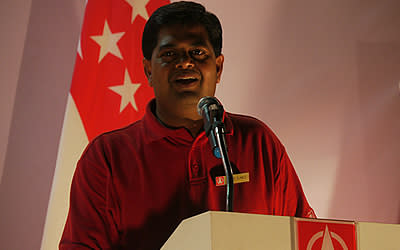Current healthcare system insufficient: SDP

The Singapore Democratic Party (SDP) has unveiled its shadow healthcare plan and criticised the current healthcare funding model as inadequate in helping Singaporeans cope with rising medical costs.
Speaking at the party's rally at Bukit Panjang on Tuesday evening, Sembawang Group Representation Constituency (GRC) candidate James Gomez presented the party's plan to the 2,000-strong crowd who braved the rain.
Gomez highlighted that the current funding model for healthcare which consists of Medisave, Medishield and Medifund is "problematic" and insufficient to tackle the rising medical costs.
According to Gomez, the rising costs is being driven up by the growing number of elderly people — with more than 9 per cent of the country's population above 65 years of age — as well as the increasing number of foreigners who seek medical care in Singapore.
"This pressure is having an impact both on the quality of patient care and it's also having an impact on our healthcare professionals," he said.
Gomez added that the current Medisave plan is ineffective to help support healthcare costs in the long run. He argued that almost 50 per cent of Medisave withdrawals in 2009 went to pay for dependents' medical expenses.
He stressed that this will result in a situation where those who are paying for their parents via Medisave may not have adequate funds to support their own healthcare requirements.
"What that is showing us is that those who are using up their money for their parents do not have enough for themselves.
"When this basic tier of funding is at risk, the other complementary elements of Medishield and Medifund cannot work well, even though they are also problematic in their own way," he said.
Touching on Medishield, Gomez pointed out that the scheme covers only a few treatment regiments while excluding a host of other illnesses and does not extend its coverage to include children born with congenital illnesses.
On the other hand, the party has proposed four key initiatives in its shadow healthcare plan which it will push in Parliament if elected.
They plan to increase the budget allocated to the Ministry of Health (MOH) from the current estimated S$4.08 billion to S$10 billion, to provide a "secure" healthcare system for Singaporeans.
It also proposes to build more hospitals to increase the number of beds and while waiting for the hospitals to be built, the party is suggesting an interim plan which explores the option of converting void deck spaces in HDB flats into allocated healthcare facilities to provide services for acute and chronic illnesses.
Apart from that, the party wants to see an increase in the number of healthcare professionals such as doctors and nurses, and a universal insurance coverage to cater to Singaporeans who work and study abroad. It added that this type of coverage can be jointly managed by the Government and appointed national insurers.
"Because the nature of our society has been evolving for many years, we want to introduce the idea of global and portable medical insurance because as a cosmopolitan society which travels a lot, to study and to work.
"So if we have a medical insurance that is medically portable, then we can look after you wherever you are," said Gomez, adding that such a model is practiced in countries such as Switzerland.
However, he went on to criticise the present system as ineffective, saying that the healthcare plan under the charge of Health Minister Khaw Boon Wan, has not "delivered".
In his explanation, he said the PAP government has pushed the bulk of financing to the people, resulting in Singaporeans having to travel across the causeway for affordable healthcare services.
"We at the SDP believe healthcare should not be a profit industry but we also believe there should be some kind of responsibility of co-payment between Government and patients but the patient component must be affordable and reasonable," he said.
Although he did not reveal the cost of the party's alternative health plan, Gomez told Yahoo! Singapore that the proposal will be financed by drawing down from the country's reserves and reducing the budget of other ministries, particularly the Ministry of Defence (MINDEF).
He said that prior to the announcement of the party's shadow plan, it had consulted with a panel of five doctors — from both the private and public sectors, but he declined to reveal their identities. The final consultation process took place two days ago, Gomez added.
At the rally, a total of nine speakers addressed the crowd, with education and ministerial salaries the focused of their speeches.
Follow Yahoo! News on Twitter and become a fan on Facebook.
This article is published by Yahoo! Southeast Asia Pte. Ltd., 60 Anson Road #13-01 Mapletree Anson, Singapore, 079914.

